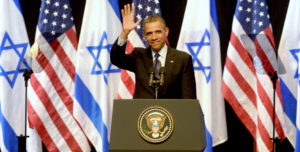by WorldTribune Staff, January 15, 2017
U.S. President Barack Obama insists he was a “good friend” to Israel during his tenure, it’s just that Israeli Prime Minister Benjamin Nethanyahu “did not recognize it.”
A pair of polls published last week showed that the majority of Israelis did not feel that Obama was their friend.

In a poll by the Israel Democracy Institute in which respondents were asked how they would characterize Obama’s behavior toward Israel, only 22 said it was “friendly” or “very friendly.”
A Jerusalem Post poll found that 65 percent of the Jewish public characterized Obama as “pro-Palestinian” and only 12 percent as “pro-Israeli.”
“What the U.S. president has consistently failed to appreciate in his dealing with Israel is that it is tough – if not impossible – for many Israelis to dream his idealistic dreams in a reality where what is more real than the values the West shares with Islam is the nightmare prospect of a terrorist plowing a truck into a group of soldiers who could easily have been their own children,” Herb Keinon wrote for the Jerusalem Post on Jan. 13.
In a Jan. 12 interview with Israeli Channel 2’s Ilana Dayan, Obama said he believes “the best traditions of the Zionist movement in Israel are consistent with the values I have tried to live by and have tried to promote here in the United States and around the world, a belief in the rule of law, a belief in human rights, a belief in freedom of the press, a belief that we treat people fairly and justly – not only when it is convenient politically, but when it is inconvenient. So it breaks my heart to see a situation in which increasingly the prospects for peace are fading away, and it is something that happens in small increments.”
“What is true, Obama continued, “is that Israel is in a very tough neighborhood, which is why I have done so much to ensure that they can protect themselves. My point to Bibi has been historically, throughout my presidency, that I will do everything necessary to make sure Israel is in a position of strength, that it can defend itself by itself. But because of that strength, then, you are then in a position to take some risks for peace. Not stupid risks, not reckless risks, but some risks.”
Keinon noted that “it is no coincidence that at that point in the interview, Obama evoked the name of Shimon Peres. There was the ideal Israeli whom Obama admired – the Israeli leader who talked of compromise and concession even when the buses were exploding and any talk of compromise and concession by the other side was in short supply.”
Israel also believes Obama increased the country’s long-term security risks by signing a nuclear deal with Iran, making the Islamic Republic a far greater regional power than it was before.
On the Palestinian issue, Obama’s final act of not vetoing the anti-settlement resolution in the UN is seen by many as having hung Israel out to dry “against a hostile world eager to pounce and pressure it to take actions the government believes is inimical to its interests,” Keinon wrote.
On Jan. 20, the Trump administration will take over in Washington.
“For most Israelis, at least according to the recent polls, that day can’t come soon enough,” Keinon said.
